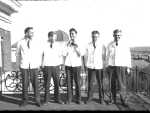|
Page
1 | Page
2 | Page 3 | Page 4 | Page
5 | Page 6
William
J. Kehler also served at the hospital in Portage la Prairie. His
first impression was similar to Henry Funk's.
“My
first impression of the work was that of a strange and somewhat
repulsive atmosphere and due to the shortage of staff, they had
neither the staff nor the time to properly train new staff. My
training consisted of one eight hour shift on the ward together
with one of the experienced staff, and the next shift I was on
my own. That was getting to know the ropes the hard way but you
learned fast. Apparently it had not been easy for some of the
regular staff to start working there either. As one of them said,
when he first applied for a job he had walked over to the institution
and stood outside for quite some time trying to make up his mind
whether to go in or turn around and walk back. But he needed a
job badly so he got up enough courage and went in. He was still
working there.”
One
of the hardest parts of the job was restraining violent patients.
“There
were times when it could not be helped, you had to get tough with
a patient and leave no doubt in his mind who was the boss. Dr.
Bristow would not stand for a patient being manhandled unnecessarily.
But when it was a case of self defense or restoring order as mentioned
previously, he understood that a certain amount of force was necessary.”
“If
necessary a patient would be restrained for short periods of time
in a straightjacket. A jacket that was laced in the back, their
arms in closed sleeves were crossed and also tied together in
the back so that they could not use their arms. This was only
done on doctor's order.”
Like
all other COs, alternative service workers in hospitals contributed
part of their earnings to the Red Cross.
“We
were paid regular civil service wages but after deductions for
room and board and the compulsory Red Cross donation, our take
home pay was very small and yet some of us managed to buy Victory
Loan Bonds [Citizens could loan money to the government so that
the government could wage war or alleviate suffering more effectively].”
 |
| COs in their hospital uniforms |
As
for personal relationships, Kehler remembers less trouble than Funk.
“I
must say that we got along very well with our superiors and staff.
Although they probably could never agree with our stand as COs
they showed no animosity and we were treated exactly the same
as the other staff. When I was leaving after my discharge, I had
a brief farewell with chief John Inglis in his office. He told
me, among other things, that we had done a good job. They were
very well pleased with the services we had rendered.” [ASM,
114-121]
Page
1
| Page 2 | Page 3 | Page
4 | Page 5 | Page
6
|


